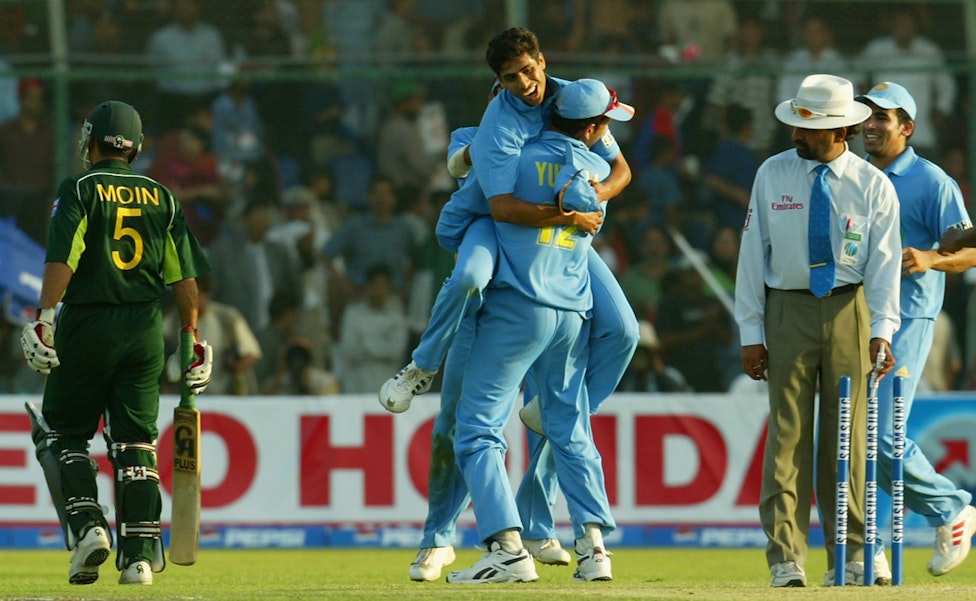 ON THIS DAY
ON THIS DAYIndia had toured Pakistan for a three-Test match series and five ODIs after a long gap of 15 years in 2004, due to Atal Bihari Vajpayee's peace initiative of 2003. While it mostly remained a high-scoring affair, the match on March 13, 2004, had become an instant classic.
Before this, India's tours to Pakistan were mainly held at neutral venues in the United Arab Emirates or Canada's Toronto. And while these venues saw decent footfall, the ambience lacked the bite that an India-Pakistan match deserved. Hence, Karachi's first ODI promised everything a cricket fan desired.
Though India had never won an ODI or Test series on Pakistan soil before that, Sourav Ganguly's effective leadership outside India kept the fans optimistic. The constant criticism of Pakistan's inability to host cricket matches owing to security concerns had their national side fired up as well, with players from both sides not lacking any motivation whatsoever.
The match was expected to have unpredictable moments, and Pakistan skipper Inzamam-ul-Haq gifted it even before a ball was bowled. India were surprisingly asked to bat first on a batting paradise, and openers Sachin Tendulkar and Virender Sehwag welcomed it with open hands.
Aided by misfields from the home team, India got off to a quick start with a run rate of 9 per over. Though Tendulkar looked out of touch, he had managed to hit four boundaries and a six, before Shoaib Akhtar dismissed him in the ninth over. But India had already scored 69 runs, which was considered an impressive start back then.
The hero for India in this match, however, was Sehwag. Pakistani bowlers’ directionless bowling was punished brutally by the aggressive opener. The 11th over of the match by Naved-ul-Hasan, which had three no-balls going to the boundary, saw Pakistan concede 24 runs to bring India’s total to 100.
Ganguly joined Sehwag in the middle of the crease, and the duo kept the scoreboard ticking with a boundary or a maximum each over. Abdul Razzaq’s first over saw Sehwag hit him for three boundaries, stealing 18 runs off that over. He looked to continue it the following over but fell to Hasan after hitting a six on the first ball.
Fans wanted thrill from this series and Sehwag gave them exactly that, hitting 14 boundaries and a maximum in his 79-run knock. India had gotten off to a dream start, with the projected score over 400 at one point, when Rahul Dravid came to the crease.
Known for his conservative approach, Dravid had famously contradicted his nature that day, hitting Razzaq for three consecutive boundaries. India had reached 200 runs in just 25 overs, following which Ganguly was dismissed, and India’s run rate slowed down.
Dravid would score 99, forging a 118-run partnership with Mohammad Kaif as India ended their innings on 349 runs. The discussion during the interval was the 38 runs that Pakistan conceded in extras.
Pakistan needed a solid start to chase down 350 runs, but Zaheer Khan and Lakshmipathy Balaji dismissed Imran Farhat and Yasir Hameed, respectively, to make life difficult for the hosts. However, Mohammad Yousuf and Inzamam had other plans.
The middle-order duo looked invincible for a long time, scoring boundaries at regular intervals to forge a 134-run for the third wicket. It was again Sehwag who provided the breakthrough in the 28th over. Pakistan responded with three boundaries in the next over to Tendulkar, with Inzamam looking more and more confident alongside Younis Khan.
The hosts needed partnerships to reach the target, and Inzamam played a captain’s knock to provide that. His smashed 122 runs, laced with 12 boundaries and two sixes and he forged another 109-run stand with Younis Khan before getting dismissed in the 43rd over.
But, the match was Pakistan’s to lose by then, with the hosts needing 72 runs in 47 balls. They needed boundaries regularly, and Abdul Razzaq’s 16-balls-27 gave them precisely that. However, once Murali Kartik and Zaheer Khan removed the duo in the next three overs, incoming batter Shoaib Malik and Moin Khan couldn’t capitalise on the foundation laid by the top order.
Ashish Nehra had 9 runs to defend in the last over, and the left-arm pacer conceded just three runs in five balls. Moin Khan needed to hit a six off the last ball - a feat that Pakistan's then-coach Javed Miandad had famously done against India back in 1986. But lightning didn’t strike twice. A disappointed Miandad standing in the balcony remained a popular image as Moin Khan was caught at extra cover to hand India an epic five-run win in Karachi.